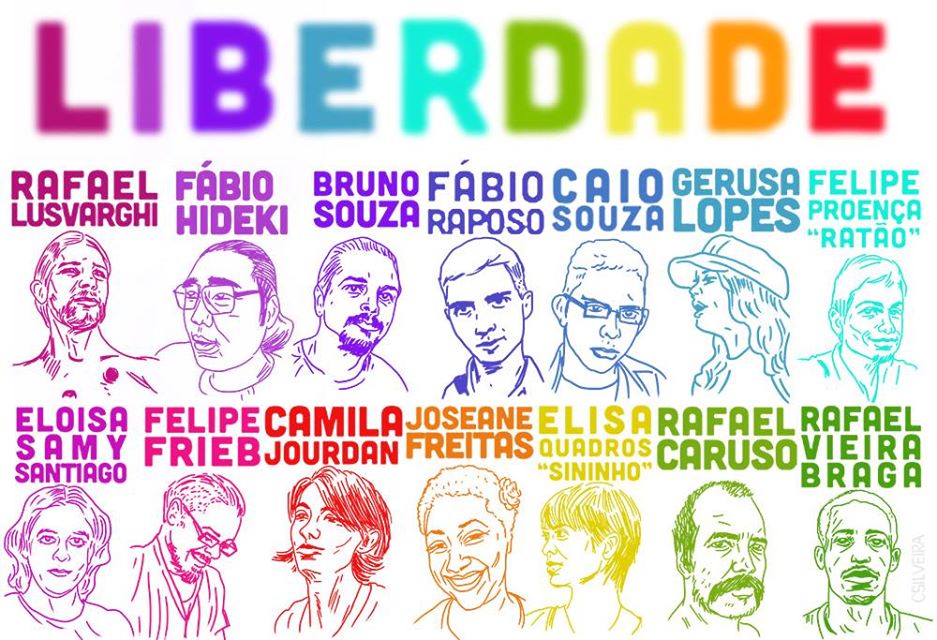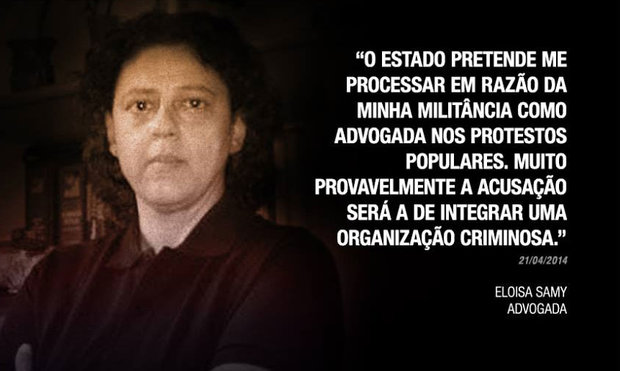![Layer Eloisa Samy Politically Persecuted Brazilian asylum seeker at the consulate of uruguay We are all [being] persecuted](https://globalvoicesonline.org/wp-content/uploads/2014/07/10372522_333407170117455_8894859022387694202_n.jpg)
“Lawyer Eloisa Samy, politically persecuted Brazilian asylum seeker at the Consulate of Uruguay. We are all persecuted”
The Uruguayan consulate in Brazil has denied a request for asylum from three Brazilians who are accused of “forming an armed gang” related to anti-World Cup protests and wanted for arrest based on what activists and alternative media are calling false evidence.
The day before the final match, police “preemptively” arrested 28 people opposed to hosting the tournament in Brazil because the activists had participated in past protests and police suspected they would engage in violent acts during a demonstration scheduled during the final.
Eloisa Samy, a lawyer who has defended imprisoned activists since anti-government protests rocked Brazil in June 2013, was one of those arrested on July 12. Formal charges weren't filed, and on July 15, most of the group, including Samy, were released after filing a habeas corpus petition.
Three days later, police, who said they had been investigating the activists since September 2013, turned over their 2,000-page investigation to the public prosecutor's office. In less than two hours after receiving it, the office filed charges of forming an armed gang against 23 activists, citing a bus arson and an attempt to set the Rio de Janeiro city council on fire.
Lucas Sada of the Institute of Human Rights Defenders criticized the public prosecutor's speed:
Essa velocidade incrível com que a denúncia foi apresentada e recebida pela Justiça só reforça que há um movimento articulado entre os poderes de criminalização dos grupos
This incredible speed with which the complaint was submitted and received by Justice only reinforces that there is clear movement among the powers for the criminalization of the groups
Moreover, the activists are accused of supporting or being part of the Black Blocs, a protest tactic of wearing black clothing and covering the face with a mask or bandanna seen at demonstrations since 2013. Some protesters dressed this way have vandalized property or committed arson.
They have denied engaging in any violence or belonging to the Black Blocs. Journalist Igor Natusch pointed out on Twitter that Brazilian authorities appear to confused the tactic for some sort of organized group:
Em privado, um amigo dá a morta: Brasil é primeiro país do mundo a tratar Black Bloc como organização e não método. Que pioneirismo deprê.
— Igor Natusch (@igornatusch) 21 julho 2014
In private, a friend jokes: Brazil is the first country in the world to treat Black Bloc as an organization and not method. What depressing pioneering

Sketches of some of the activists who have been jailed since June 2013.
Samy, her son David Paixão and his girlfriend Camila Nascimento were ordered arrested. The three sought refuge in the Uruguayan consulate in Rio de Janeiro on July 21, saying that they were facing political persecution. The defense lawyers of those arrested have found it difficult to access the proceedings, including Judge Siro Darlan, who released many of the activists after the preemptive arrests.
Once authorities realized the three were there, military police arrived and tried to enter the consulate. An employee prevented their entry in what could have become a serious diplomatic incident, according to Idelber Avelar, a professor at Tulane University in New Orleans:
Eloisa se encontra agora no Consulado do Uruguai, no Rio de Janeiro (Praia de Botafogo, 201), que a Polícia Militar tentou invadir — coisa que não aconteceu nem na ditadura militar.
Eloisa is now in the Consulate of Uruguay in Rio de Janeiro (Praia de Botafogo, 201), which the military police tried to break in — something that didn't even happen during the military dictatorship.

“The state intends to prosecute me because of my activism as a lawyer in popular protests. Most likely the prosecution will be to link me to a criminal organization” Eloisa Samy on 21 April, 2014
The Institute of Human Rights Defenders reported that military police with motorcycles surrounded the building while the three were inside.
In a video posted on YouTube with English subtitles, Samy denounces her situation and the situation of all the others who she calls “political prisoners” and asks for amnesty:
The Collective Mariachi interviewed her inside the consulate as well as lawyer Rodrigo Mondego from the Human Rights Committee of the Bar Association. In the video, Samy says that one of the reasons that led her to seek asylum in Uruguay was the story of its president, Pepe Mujica, who spent seven years in solitary confinement as a political prisoner during the dictatorship of his country:
On the evening of the same day, the Consul of Uruguay Myriam Fraschini Chalar denied them asylum. Journalist Fernando Rodrigues posted on his blog the official position of the Foreign Ministry of Uruguay, sent to him:
O [Brasil] é um Estado de Direito, não persegue ninguém por razões políticas, e o Uruguai não interfere em decisões judiciais.
In [Brazil] there's a rule of law, [it] does not persecute anyone for political reasons, and Uruguay does not interfere in judicial decisions.
The decision was criticized by international law professor Daisy Ventura on her Facebook and Twitter account:
Como comentei ontem, qualquer decisão do Uruguai seria criticada. Mas a resposta do governo, se de fato foi esta, é muito infeliz.
— Deisy Ventura (@Deisy_Ventura) 22 julho 2014
As I commented yesterday, any decision of Uruguay would be criticized. But the government's response, if indeed this is it, is very unfortunate.
O Brasil é uma democracia, não caberia asilo. Já esqueceram Assange? Alguém acha que a Inglaterra não é uma democracia? E quando o Brasil abrigou um Senador boliviano por cerca de um ano em nossa missão em La Paz, ele pretendeu questionar o Executivo ou o Judiciário da Bolívia? Claro que não, pois Morales é aliado político do governo brasileiro.
Brazil is a democracy, an asylum wouldn't fit. Have you forgotten [Julian] Assange? Does anyone think that England is not a democracy? And when Brazil hosted a Bolivian senator for about a year in its mission in La Paz, did [Brazil] intend to question the Executive or the Judiciary of Bolivia? Of course not, because [Bolivian President Evo] Morales is a political ally of the Brazilian government.
Assange, the founder of WikiLeaks, was granted asylum from Ecuador in 2012. He is wanted in Sweden on sexual assault charges, but fears he will be extradited to the U.S. because of his site's release of state secrets, so he has remained in Ecuador's London consulate.
Former Bolivian Senator Roger Pinto Molina was one of the main opposition members to the government of Bolivian President Evo Morales. Molina, who was accused of a litany of crimes including corruption by the government, he sought and was granted asylum from Brazil in June 2012 claiming he was politically persecuted. But Bolivia refused to allow him passage out of the country, so he lived in the Brazilian embassy in La Paz for a year. Then, Molina received the help of the temporary ambassador Eduardo Saboia to escape, creating a major diplomatic incident.
According to various media sources, Samy, her son and her son's girlfriend escaped the consulate with the help of Deputy Janira Rock of the Socialism and Freedom Party (PSOL), who accompanied them throughout the day there. Their current whereabouts are unknown.
Activists like professor Eduardo Sterzi soon pointed fingers at who they thought was the responsible for persecuting the 23 activists in Rio:
Tristeza imensa por nossos governantes terem nos empurrado novamente para esse tempo podre. Vergonha enorme de ter votado toda a vida no PT, um dos maiores responsáveis pela criminalização de manifestantes políticos.
Immense sadness for our rulers who pushed us back to that rotten time [of dictatorship]. Huge shame to have voted all my life for the PT [Workers Party], one of the main parties responsible for the criminalization of political protesters.
On Twitter, others were also critical of President Dilma Rousseff and her PT government:
Agora o autoritarismo do governo Dilma é de conhecimento internacional, com presos políticos pedindo asilo em consulados. Vivi pra ver.
— Mauricio Caleiro (@M_Caleiro) 21 julho 2014
Now the authoritarianism of the Dilma government is internationally known, with political prisoners seeking asylum in consulates. I lived to see this.
A ex-presa-política @dilmabr e seu @JusticaGovBR vão se manifestar quando do pedido de asilo político em plena “democracia”? #EloisaSamy
— Daniel Nascimento (@dgcnascimento) 21 julho 2014
Will ex-political prisoner Dilma Rousseff and her Ministry of Justice speak on the request for political asylum in full “democracy”? #EloisaSamy
On July 24 judge Siro Darlan granted an habeas corpus for all the refugees and political prisoners.







1 comment
If you’ve dedicated your life to protesting a soccer game, you have too much free time.